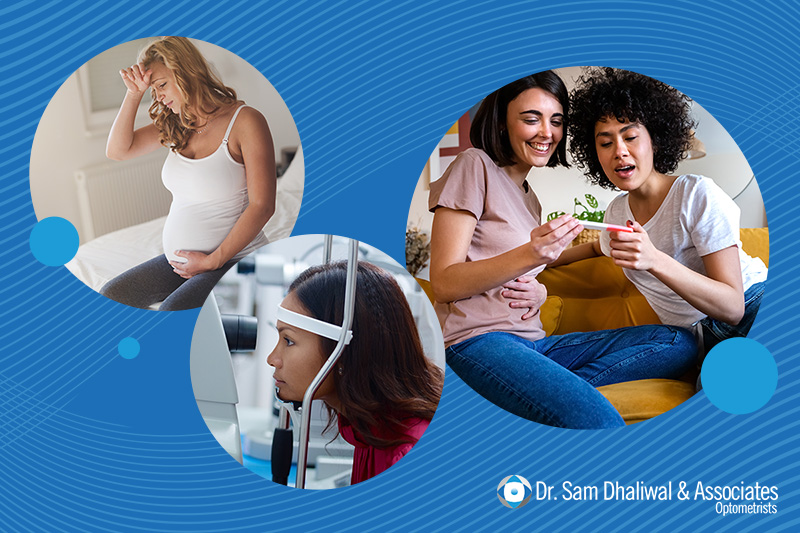During pregnancy, your body undergoes lots of changes. Did you know that these changes can even affect your vision and eye health?
It’s true: changes in your hormones, fluid retention, blood circulation, and metabolism can all affect your vision. Thankfully, these changes are usually minor inconveniences that resolve on their own after delivery.
If you’re planning to become pregnant or already are, it’s a good idea to book an eye exam with us so we can work to minimize any pregnancy-related issues with your eyes. It’s safe to have your eyes examined while pregnant, and can help to identify conditions that may put you or your baby at risk.
Dry eyes
A common eye change experienced during pregnancy is an increase in dryness and irritability. This is caused by shifting hormones and can make your eyes feel scratchy and uncomfortable.
You may find relief by using lubricating drops like artificial tears that reduce the symptoms of dry eyes. If you wear corrective lenses, make sure you’re using drops that are safe for use with contacts. Dry eyes during pregnancy are rarely serious, but left untreated, they can lead to tissue damage.
In addition to talking to us about dry eye treatments, you can also boost your intake of beneficial omega-3 fatty acids from sources like salmon, walnuts, and flax seeds. These fats will help lubricate your eyes naturally as well as support the brain development of your baby.
Fluid retention
A lot of people notice that they’re more prone to retaining fluid in pregnancy. Fluid retention leads to puffiness and swelling, and you may notice that your rings feel too tight. It also has a similar effect on your eyes, increasing the thickness and curvature of your cornea. This can cause changes in your vision.
If you’re experiencing fluid retention, you may notice that your sight is blurry or hazy. Images won’t appear as sharp as they usually do. For some people, these changes only occur in one eye or in part of their field of vision, while others have changes in both eyes. It may even be significant enough to change your prescription for corrective lenses.
You may need to stop wearing contact lenses if the shape no longer fits your eye properly. We can evaluate whether or not you need your prescription adjusted, but since the symptoms are usually temporary and mild, you may not require new lenses.
Serious cases of blurred vision may indicate conditions like preeclampsia or gestational diabetes, so it’s always important to let us know if you’re affected. However, most cases of blurry vision will resolve on their own after delivery.
More serious conditions
• Excessive swelling or puffiness
• Double vision
• Sensitivity to light
• Loss of vision
• Seeing floaters or flashes
In addition to diabetes and preeclampsia, serious problems can be caused by complications of Graves’ disease, multiple sclerosis, tumors, or other health conditions. Book an appointment as soon as possible to discuss your concerns with a medical care provider and/or optometrist.
What can you do?
We welcome you to make an appointment ahead of conceiving to discuss any concerns you have about your vision or medical conditions. You may need to adjust your medications or have additional screenings in pregnancy to ensure your and your baby’s health is protected.
If you’re experiencing minor changes in your vision that aren’t concerning to your medical provider, there are a few things you can do to help alleviate symptoms. It may help to take frequent breaks and to rest your eyes regularly, including taking naps. Try to work in well-lit areas that reduce the strain on your eyes. Limit screen time to avoid exposure to blue light that may make symptoms worse.
Some people experience increased sensitivity to light during pregnancy. It’s important to shield your eyes from damaging UV rays by wearing a quality pair of sunglasses, especially if your eyes are more sensitive to light.
During pregnancy, it’s not only important to take care of your own vision, but also to protect the vision of your unborn baby. Smoking, drinking alcohol, and taking drugs while pregnant may all increase your risk of having a baby with vision problems, including lazy eye (amblyopia), crossed eyes (strabismus), and refractive errors.
Rest assured that most changes in your vision will resolve themselves without treatment soon after you give birth. If your symptoms persist, we recommend booking an appointment to have your eyes assessed.

